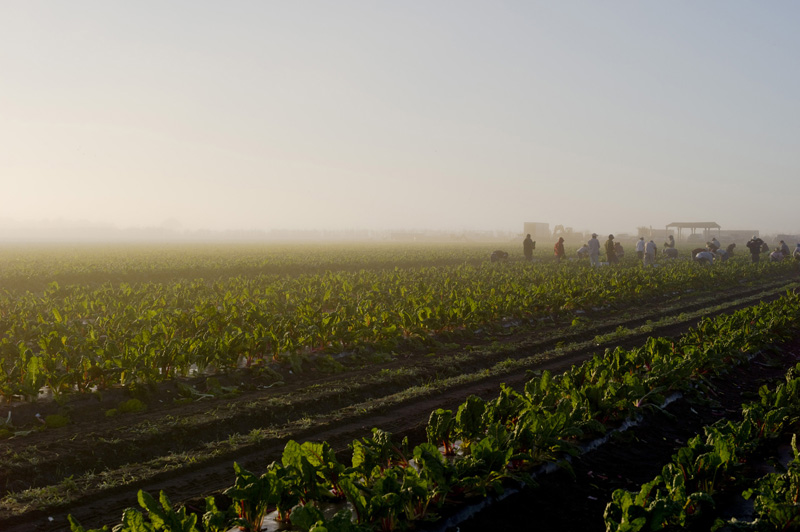
by guest blogger Anthony Suau, Pulitzer Prize– and Emmy Award–winning photojournalist, and director of Organic Rising
I was born and raised in the late 1950s in Peoria, Illinois, the heart of the American Midwest, often referred to as the Corn Belt. I had no idea as a child that I had access to some of the healthiest and tastiest food in the world, and that later in life this food would be very hard to come by.
Every year my parents purchased a grass-fed Black Angus cow to feed our seven family members. I can still picture those white paper meat packages stored in the basement freezer that my mother would pull from once or twice a week. My siblings and I were raised on the purest, tastiest steaks we would ever eat, especially when my father served them right off the grill in the backyard. The Corn Belt corn-on-the-cob was plentiful, each kernel thick and exploding with juices. The tomatoes, potatoes, and watermelon were locally grown—some in our own backyard garden.
There were no GMOs, corn-fed beef, or antibiotics in the animals. To this day, I have a clear memory of how that food tasted. It became a cornerstone to compare everything else I have eaten in my adult life. The fact is that it was pure and simple.
I moved to New York shortly after college, and subsequently to France, traveling the world as a photojournalist. Certainly, I tasted delicious food from the far reaches of the globe, including Africa, Asia, South America, Eastern Europe, and of course, France. Yet, for me the food I had tasted as a child, grown in some of the world’s richest soil, remained the finest.
When I returned to live in the U.S. in 2007, after 20 years overseas, I found that the processed food and meats were not just tasteless but even inedible to me—and I wanted to know why.
What had happened?
What I learned was shocking. According to the Robert Wood Johnson Foundation, 1 in 5 American deaths can now be associated with obesity. Toxic systemic pesticides can be found in many GMO food products that make up as much as 70 percent of the food on our supermarket shelves. Equally astounding is that nearly 80 percent of the antibiotics in the United States today are fed to our factory-farm animals to make them grow faster and survive the crowded and unsanitary conditions they live in.
In the summer of 2012, I traveled to Santa Cruz, California, to begin a short film on the rise of organic farming in the U.S. I met farmers Jeff Larkey of Route 1 Farms, Tom Broz of Live Earth Farm, and Joe Schirmer of Dirty Girl Produce. There, I tasted foods that for the first time surpassed anything I’d eaten since I was a child, and I was hooked!
It’s taken me a long time to understand what’s happened to the American food system over the past few decades. I also learned from the more than 25 organic farmers that I interviewed across the country that their intention is not only to produce the healthiest and tastiest food possible, but also to create a community around their farms that celebrates food. The concept is simple: Grow food for human consumption, not for massive profits.
During the past two years it became obvious to me that the time is right for an in-depth educational film that explains what organic is, how to access it, and what the future holds. My research also shows clearly that this future depends on a healthy growth of organic farms and farmers that will result in greater production with wider accessibility. Education inevitably plays a key role in making that happen.
With this film I intend to use consumer education as a means to help build a healthy sustainable food system that is accessible to all Americans while also protecting the environment. Recent documentaries such as Food Inc. and Blackfish have proved that a powerful film can have widespread positive impact on our society.
My hope is that the food and farming community will embrace Organic Rising and make it a defining statement within a positive movement. As farmer Jeff Larkey of Route 1 Farm states in the trailer, “Organic farming is really the only hope, in terms of an agricultural system, that is going to feed the world going into the future in a sustaining way.”
You can help support the creation of Organic Rising here.
 Anthony Suau has been awarded the Pulitzer Prize, an Emmy, and two World Press Photos of the Year for his photography. He has twice received an International Center of Photography (ICP) Award and was honored with the prestigious Robert Capa Gold Medal award. As a TIME magazine contract photographer for 20 years, his images have been published and exhibited worldwide and he has published four successful books. Currently, he is directing the feature documentary film Organic Rising.
Anthony Suau has been awarded the Pulitzer Prize, an Emmy, and two World Press Photos of the Year for his photography. He has twice received an International Center of Photography (ICP) Award and was honored with the prestigious Robert Capa Gold Medal award. As a TIME magazine contract photographer for 20 years, his images have been published and exhibited worldwide and he has published four successful books. Currently, he is directing the feature documentary film Organic Rising.




You can help support this film here: https://www.indiegogo.com/projects/organic-rising
Yes, films can educate many. When I saw Food, Inc. it changed my life! I went completely Organic in all my food and after one year of only organic food, my health improved. My suffering from allergies was cut more than half. I no longer wake up at night coughing my lungs out. Organic food costs much more, and is worth it!! I have given up eating out and going to movies, etc. just so I can afford good organic food which makes my life so much better. I wish you well on your new film and hope many people support it and many more see it and have their lives changed for the better. Thank you.
Im back to my roots in the midwest going Organic miss all the fresh vegies grass fed cow a yr and hog farm raised chicken all rite out of the field.
http://www.dr-schnitzer.de/americas-second-chance.html
This is a documentation between a German Dr. and the White House. If you read it, you`ll understand why I inserted the Link.